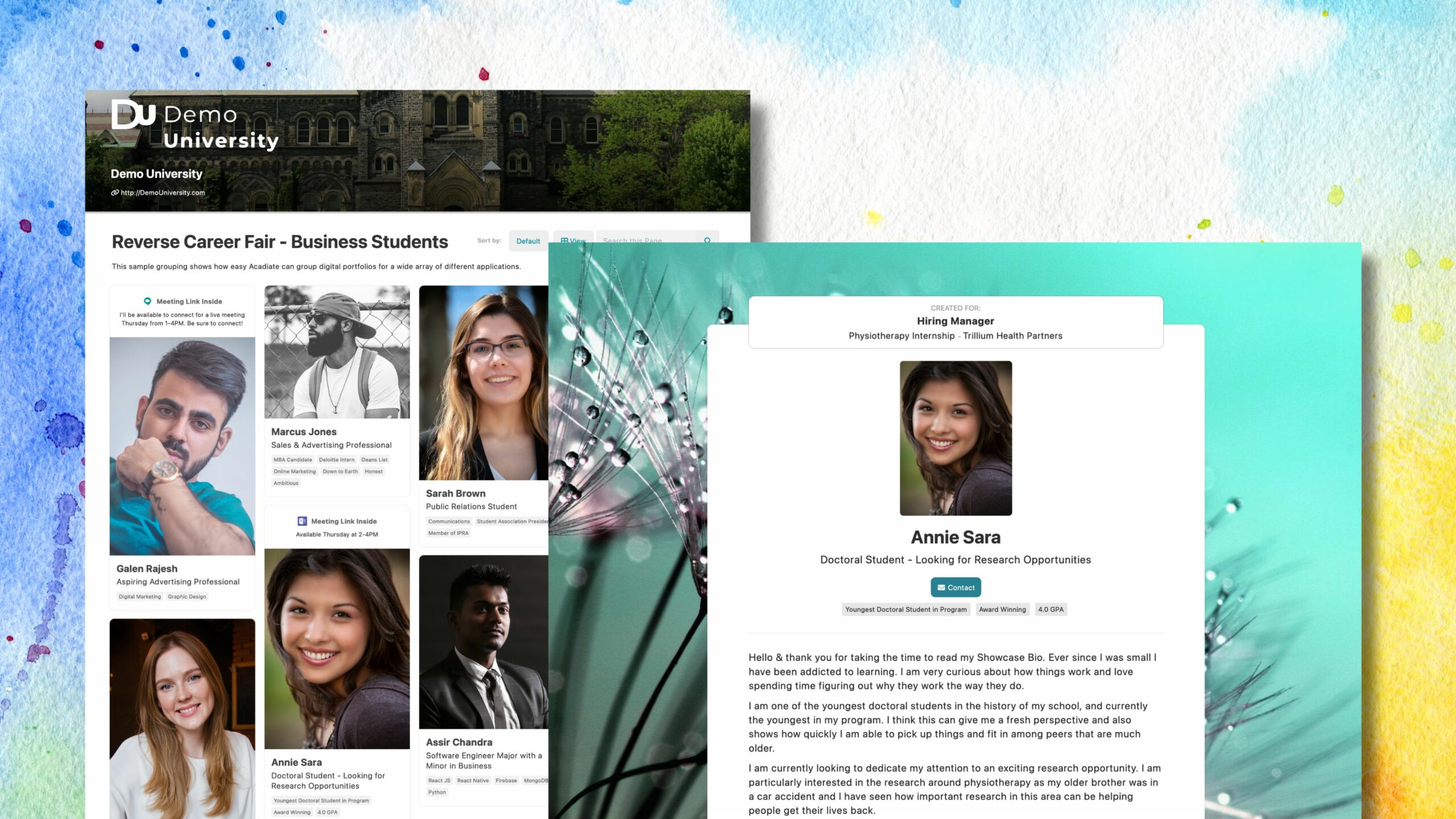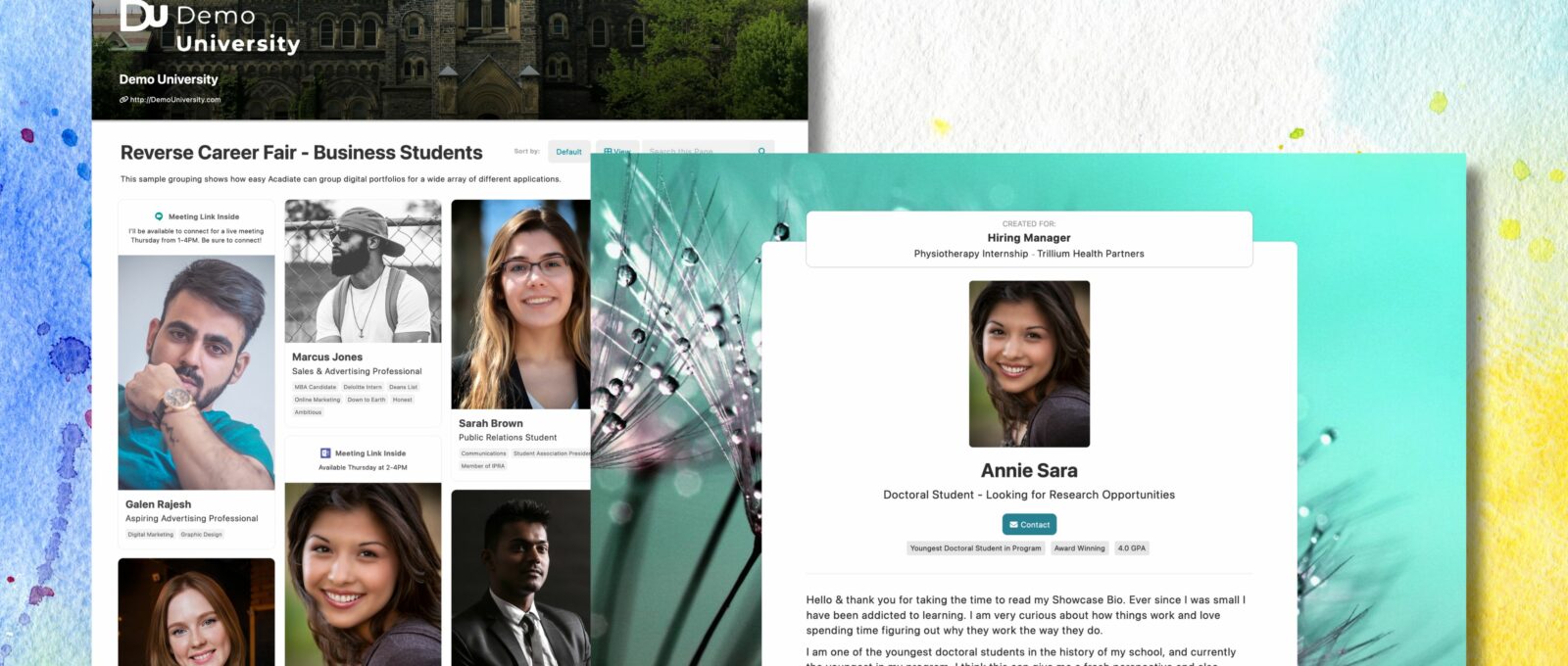In a traditional career fair, eager students approach company booths, hoping to make a lasting impression with their resume and quick pitch. A ‘Reverse Career Fair’, however, flips this dynamic. Instead of employers staffing booths, students or job seekers showcase their abilities, accomplishments, and aspirations, attracting potential employers. The benefits of this innovative model are numerous, so every career center should consider hosting reverse career fairs as part of their career development strategy.
Reverse career fairs are taken to the next level by hosting them online – it makes them more equitable and more accessible. Acadiate is the easiest and most affordable way for career centers to begin offering this amazing service to students with free options to start.
Contents
Benefits for Career Centers
1. Enhanced Reputation
Career centers can use reverse career fairs to showcase the skills and potential of their students. By matching academic accomplishments with the requirements of different industries, they can improve their institutional reputation. The unique structure of reverse fairs highlights adaptability and forward-thinking, thus making them more appealing to potential partners and stakeholders.
2. Increased Engagement
Reverse career fairs offer career centers exceptional opportunities to connect with students at a deeper level. The career centers actively collaborate with students during the fair setup by discussing their skills, experiences, and project displays. This level of engagement fosters a more vibrant and interconnected community within the center, promoting skill development and career readiness.
3. More Industry Partnerships
Organizing reverse career fairs can be a great way to establish strong partnerships between career centers and industry representatives. Such events allow businesses to experience the talent pool nurtured by the institution first-hand, which can lead to potential internships, collaborative projects, or industry-sponsored initiatives. These partnerships can offer students and businesses valuable opportunities to grow and succeed.
4. Increased Participation
Reverse career fairs can attract more students by providing them with an easy space to showcase their projects and achievements. This empowers the students and makes the event more appealing to a diverse range of fields and backgrounds, amplifying the event’s scope and effectiveness.
Benefits for Students
5. Empowerment
Reverse career fairs provide a valuable opportunity for students to showcase their skills and projects and to gain confidence in presenting themselves professionally. Participating in such events can help students improve their communication and networking skills, which will be useful in their future job search. Overall, reverse career fairs are an excellent way for students to empower themselves and prepare for a successful career.
6. Visibility
Reverse career fairs ensure high visibility for students to various potential employers in a single event. This enables students to stand out from students from other institutions. Students who sharpen their self-marketing and create innovative showcases amplify the uniqueness of their skills, projects, and aspirations.
7. Networking
Passive job searches turn into active networking sessions at these fairs, providing ample opportunities for students to engage with potential employers and establish valuable professional connections that can transform their career paths.
8. Real-world Experience
Preparing for a reverse career fair exposes students to real-world scenarios. They learn to manage the project of their presentation, strategize their communication, and think like entrepreneurs, providing them with an edge for their future careers.
Benefits for Employers
9. Diverse Talent
Reverse career fairs allow employers to access a diverse pool of talent. While traditional recruitment methods may have limitations in reaching out to potential candidates, the unique setting of reverse career fairs allows employers to connect with students from different disciplines directly. This leads to a more diverse and varied range of potential hires, ultimately enriching the talent pool for employers.
10. Comprehensive Candidate Understanding
In reverse career fairs, employers can gain a more comprehensive understanding of candidates beyond their resumes. This allows for detailed discussions about candidates’ skills, projects, and experiences, resulting in better alignment with job requirements.
11. Time and Resource Efficiency
Screening multiple candidates in one location saves recruiters time and money. Comprehensive displays and direct interactions streamline the screening process, reducing recruitment costs. Hosting an online reverse career fair takes this even further by removing geographic limitations.
12. Quality Interactions
In reverse career fairs, recruiters and candidates have quality and in-depth discussions instead of brief and rushed meetings. This allows employers to better understand students’ abilities and explore their project experiences. By having a first-hand view of their potential, the selection process is elevated, increasing the chances of finding the right hire. This interaction quality is a significant improvement over traditional brief or speed interview processes.

Most career centers don’t actively do reverse career fairs because they have been perceived to be difficult to organize. Taking reverse career fairs online with Acadiate dramatically simplifies the process and makes it easy for every career center to become more active in this area, empowering career centers to provide their students with this innovative approach.



